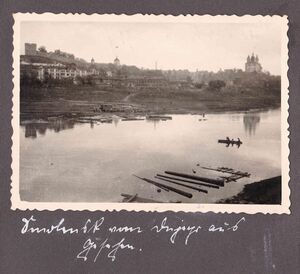6. August 1946
| GEO INFO | ||||
|---|---|---|---|---|
| The red pins in the map show a possible construction site and three locations of military hospitals. | ||||
| Liqueur factory | ||||
| Power station | ||||
6 Aug 46. New detachment: Road construction. A country road leading into Smolensk from the north is to be improved. The road, actually just a better land route, passes the airfield, which is located on the northern outskirts of Smolensk. That’s why a pilot officer is being taken out of our brigade. After all, he could take off in an aeroplane!
Each man is assigned 10 m of road to complete per day. The main thing is to level the road and dig the side ditches. The work is an unparalleled drudgery. The worst thing about it is the miserable equipment, the bad shovel, with which one toils away and still achieves nothing. The regulars of this brigade have their marked spades, of course, which they use every morning. The newcomers have to work with the brass that is left over. On this job I have realised that having good tools is half the work. Since I am often behind, I have to go back to work right after lunch, foregoing the lunch break, while the others lie down on the grass for a nap after their meal. Nevertheless, it happened that I was still not finished in the afternoon, so that the comrades had to finish my section shortly before the end of work, which they did surprisingly without grumbling. No wonder I couldn’t cope with the heavy work with the water soup rations in the long run. I was getting leaner and leaner.
On the way back to the camp we always marched in column, and since the Russian guards liked to hear us sing - I noticed this often - we sang our old soldier songs. Our way also led past a Russian military hospital, and the injured Iwans stood by the fence and listened to our song: “... German freedom fighters fall, but they don’t waver nor retreat...”[1] Then they threw stones at us in anger. They hit one of them in the ear. He didn’t want to sing along any more.
The only good thing about this command was that I earned relatively well. Anyway, after deducting all the compulsory contributions, I still got a few Rubles out of it. But after two weeks I had to give up the command. I had collapsed. It wasn't even the hard work alone that knocked me out, but the fact that we couldn't sleep peacefully a single night because of the terrible plague of bedbugs. The bare, straw-sack-less wooden plank bed in the cinema hall was completely bugged. We tossed and turned restlessly until we frantically sat up, stripped off our shirts and scanned them for bugs, which we picked between our thumbnails. This happened every night. My record was 67 bugs. That's the only thing we have in abundance here: Bugs, lice and fleas.[2]

Liqueur factory.[4] A pleasant command, easy work. There are only four of us. Here, too, no access whatsoever to the actual factory sites, only side work of various kinds. Mainly we fish logs out of the Dnieper. The factory is located directly on the river. We get an extra lunch here at the factory, which we take in the canteen. We sit at a special table, somewhat separated from the Russian staff. They don't take any notice of us either.

One night our small detachment is additionally deployed to unload coal trains at the power station[5] because it has to be done quickly. The work lasted from 9pm to 5am. In return we got the next day off. But we decided to go to work the next morning after all, so that others wouldn't be assigned to our pleasant detachment. Nevertheless, we were soon relieved. Such jobs are in great demand.[6]
|
Editorial 1938 1939 1940 1941 1942 1943 1944 1945 1946 1947 1948 1949 Epilog Anhang |
|
January February March April May June July August September October November December Eine Art Bilanz Gedankensplitter und Betrachtungen Personen Orte Abkürzungen Stichwort-Index Organigramme Literatur Galerie:Fotos,Karten,Dokumente |
|
1. 2. 3. 4. 5. 6. 7. 8. 9. 10. 11. 12. 13. 14. 15. 16. 17. 18. 19. 20. 21. 22. 23. 24. 25. 26. 27. 28. 29. 30. 31. Erfahrungen i.d.Gefangenschaft Bemerkungen z.russ.Mentalität Träume i.d.Gefangenschaft Personen-Index Namen,Anschriften Personal I.R.477 1940–44 Übersichtskarte (Orte,Wege) Orts-Index Vormarsch-Weg Codenamen der Operationen im Sommer 1942 Mil.Rangordnung 257.Inf.Div. MG-Komp.eines Inf.Batl. Kgf.-Lagerorganisation Kriegstagebücher Allgemeines Zu einzelnen Zeitabschnitten Linkliste Rotkreuzkarte Originalmanuskript Briefe von Kompanie-Angehörigen |
- ↑ The words come from a rare version of the Sedan Song, to which this stanza is added:
“German heroes, German men. Great God, we praise you.
German freedom fighters fall, but they don’t waver nor retreat.” - ↑ A contemporary witness told Cartellieri (p. 58), that the Soviets successfully controlled lice.
- ↑ with friendly permission from the privat archive of Daniel Popielas, Welzow
- ↑ It was the Smolensk distillery (Смоленский ликеро-водочный завод), renamed Bachus (БАХУС) in the 1990ies (acc. to Redaktion smolnarod.ru) and liquidated 2017.
- ↑ In the power station there was another more extensive deployment at the beginning of 1948.
- ↑ It is unlikely that the author was able to do day and night work immediately after collapsing at road construction due to lack of sleep, so the liqueur factory certainly belongs to a different period.
